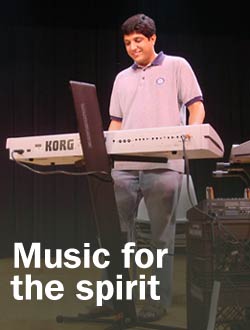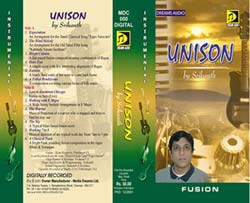Home > News > Specials
The Rediff Special/M D Riti
April 22, 2003

During the week, he is a software professional. Come weekends, he is busy writing music, recording songs by amateur musicians like himself and compiling them into albums.
Sreekanth Devarajan, who lives in Pittsburgh, USA, and works for Verizon, says, "One of my goals in coming to the US was to become a professional musician. But now that my music is slowly taking off, I am not sure I would really like to switch careers. I really love being a computer professional. And, despite my busy work schedule, I have more time to play music in the US. I am usually at my studio till well past midnight every day. I sleep for only about five hours. That is more than enough, as music is also a form of relaxation, right?"
Sreekanth, who has become quite popular in Tamil music circles in the US, has invested about $20,000 in his studio so far. He has already released three albums -- recorded and mixed in the MP3 format -- in the US: Simple Thoughts Volume 1 and 2 and Folkal Point and sold about 50 copies each. He also gives free downloads of his songs through his website and claims 300-500 unique hits a day.
He has just released Unison, his first album in India, in Chennai, which has sold over 500 copies.
"As a small boy growing up in Chromepet, a suburb of Chennai, in the mid-seventies, I was always going to light music shows with my parents and uncles," recalls Sreekanth, who has been in the US since the last five years. "This got me more interested in film music than in classical stuff. Then, an uncle gave me a small keyboard and I started playing serious music."
Sreekanth soon asked family friend Mani Sharma, now a successful composer for Tamil and Telugu films, to help him get into professional music. But Mani advised Sreekanth's conservative, middleclass parents to relegate music to the status of a hobby. "I gave in and went to evening college, spending my day learning piano, playing music and going for computer classes," he sighs. "My real ambition all along was to build my own studio."
Cousins living in the US got him sound modules and cards. Sreekanth, who had begun working as a computer operator, simultaneously composed music for jingles and television serials in Chennai with his friend John Peter, often using his knowledge of computers to make music sequences on a PC. Starting his music group, Aalapana, seemed the next logical step and he was soon doing live gigs.
But it was only when he moved to Minneapolis in 1996 that everything fell into place. Sreekanth began buying music equipment every month and, soon, he had achieved his dream of starting his own studio.
Sreekanth does not hire out his studio or its recording services. He only uses it to record and mix albums of his choice with amateur artistes based in the US. Like him, most of them are software professionals. He jets all around the US meeting new talent, recording them, sometimes even mixing music in various places. Some of the people he regularly records with are Udhaya, a lyricist based in San Francisco's Bay Area, Raja Govindarajan, a popular singer based in Kansas who does stage shows regularly, sound engineer Krishna, also from the Bay Area, singers Vijay from Seattle and Ravi from Pittsburgh.

"People contact me through friends or through my web site," says Sreekanth. "I first hear some sound samples. If I am impressed, I create a track that matches his or her voice. Every song I compose has a goal or a subject. For example, for the song Warrior in my album, Unison, I took a raga called Kalyanavasantham and created a flamenco fusion track. The theme revolves around the story of Abhimanyu.
"I generally explain the subject of the song to the lyrics writer. He comes with the first cut and we work on it. We make the final one in a day or two. Then I record the song track by track, make a digital copy and send it to the singer, who then visits my studio to record. We finally come out with a mix-down for release, which takes about a month."
Sreekanth and his artistes are able to indulge their passion because they have successful alternate careers. "I can create music and produce it, but I am very bad at selling it," he admits readily. "If I could market my music better, I am sure I could make it more profitable. But if I were ever to get a break in making music for Indian movies, I think my studio will really turn the corner."
Image: Dominic Xavier
The Rediff Specials